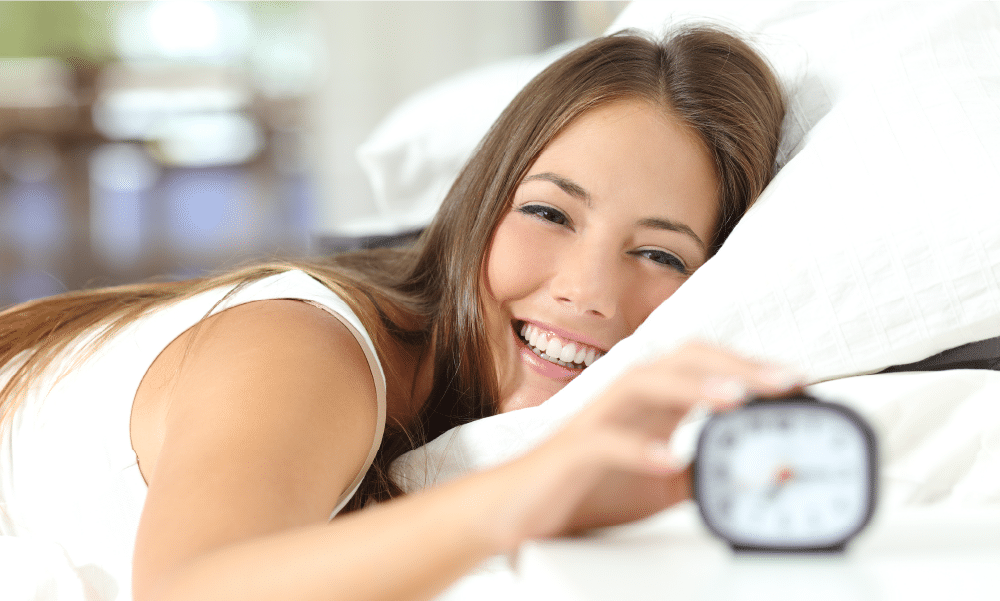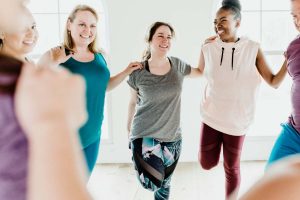Tips for a good night’s sleep in harmony with the inner clock:

“Sleep to get well” is a well-known advice. But does it really work? When the clocks are set one hour ahead to daylight saving time, we feel the negative effects of sleep deprivation particularly acutely. Many people then suffer from fatigue, difficulty sleeping, concentration problems and mood swings. Can lack of sleep be responsible for all these problems? Science says yes, and studies show there are many more health problems when sleep is insufficient. The risk of obesity, addiction, cancer and depression increases with chronic sleep deprivation.
This article is about
• why sufficient sleep protects against diseases,
• what role the inner clock plays in this and
• how to promote good and sufficient sleep.
What is sleep anyway? A definition:
“[Sleep] is a usually periodically occurring state of rest and shutting oneself off from the environment with reduction or suspension of daytime consciousness and voluntary movement (motor activity). Today, at least two forms of sleep are distinguished: orthodox (non-REM sleep, dreamless sleep) and paradoxical or REM sleep (rapid-eye-movement).”
Why is adequate sleep important for health promotion?
Sleep promotes health because our bodies function differently than when we are awake. The brain goes through different sleep phases that have important functions for the body and psyche. Learned information is sorted and stored. And the removal of metabolic products in the brain, which the body no longer needs, works four times faster than in the waking state. If these processes are disturbed, then these “waste products” accumulate. Links are suspected with the risk of neurogenerative diseases, such as Alzheimer’s and Parkinson’s. Other disease risks have already been demonstrated. Lack of sleep leads to increased blood pressure. So those who suffer from chronic sleep deprivation increase the likelihood of cardiovascular disease . Another negative effect of too little sleep is increased blood sugar levels, which can lead to type 2 diabetes. Those who sleep too little also crave more sugary food, which in turn promotes obesity. In addition, performance drops sharply.
How does our internal clock work?
The sleep-wake rhythm is called the circadian rhythm. There are certain genes in the body that keep it in time by building up and breaking down proteins. The biochemical process that controls the internal clock is quite stable. It has evolved over the course of evolution parallel to the day-night rhythm. Every single cell is controlled by the internal clock. But not all of us are timed exactly according to sunrise and sunset. There is a whole spectrum of genetically individually determined rhythms. The scientific term for this is chronotype. The smaller part of the population belongs to the lark chronotype. These are the people who naturally wake up before 6 a.m. without an alarm clock. Then there are the normal types, who get up between 6 and 8 o’clock. And the owls, who – no, not sleep longer – like to get up later and are awake longer. And not just according to the time of day. For owls, which include the larger part of the population, the entire sleep-wake cycle also lasts longer than 24 hours. So they have a slightly longer awake time. How many hours of sleep one needs is also quite individual and independent of chronotype. If we take into account our needs, health promotion happens during sleep.
Here (https://www.ifado.de/fragebogen-zum-chronotyp-d-meq/) you can test which chronotype you are.

It would be ideal if everyone followed their own natural need for sleep. Getting up without an alarm clock ringing when you wake up by yourself and going to bed when you are tired. If you try this out on vacation, you will find out how many hours of sleep and which bedtimes are personally the best. For the lark type, this means canceling evening activities when the body signals: I prefer to go to bed early. The owl type should at best have a job with flexible start times and get up later in the morning. Even half an hour more sleep can be enough to live healthier and concentrate better throughout the day.
Unfortunately, it is seldom possible to completely adjust to one’s own sleep needs. But you should make full use of the leeway you have. Here are three tips on how to do that:
1. Light makes you awake, darkness promotes sleep
The strongest influencing factor on the inner clock is daylight. Take advantage of every opportunity to be outside, for example having breakfast on the balcony. If you work at a desk, you can counteract the lack of daylight with a daylight lamp. To promote health on several levels, leave your car at home and ride a bicycle or walk. To fall asleep better, it helps to dim or avoid light sources in the evening. For example, switch your cell phone or tablet to an appropriate light or, even better, don’t use them at all before bedtime. A bedroom that can be well darkened also promotes sleep.

2. Rituals structure the day
A daily structure also influences the internal clock. Fixed times for meals, exercise and a good night’s rest are like a clock for the body and its chemical metabolic processes. Three hours before bedtime, you should not eat anything that is difficult to digest. To get the body into rest mode in the evening, personal rituals help. For some this can be meditation, for others half an hour of reading or mindful body care.

3. Taking your own needs seriously
Social expectations often influence us more than we want to admit. “The early bird catches the worm” or “If you snooze, you lose” are beliefs that we have internalized. But for some people, it would be much healthier to sleep a little longer and then walk leisurely to work instead of setting the alarm and turning on the computer as quickly as possible. Employers who take this into account benefit from higher-performing, healthier and happier employees. Flexible work schedules, meetings during core hours, and positive feedback for using flextime are all health promotion measures.
Perhaps the distribution of tasks in the family can also be reorganized according to chronotypes. The larks make breakfast and the owls take care of cleaning up in the evening. And the organization of leisure time may also need to be rethought. An owl type does not do himself any good to get up even earlier to go running. Maybe that would be possible during the lunch break. Whereas the yoga class at 9 p.m. is already in bedtime for the early riser.
Sleep is just as important for promoting health as exercise and a healthy diet. That’s why you can now also collect bonus points with the Changers app if you pay attention to sufficient and good sleep. Simply select this in the activities.
Sources:
Mailab, How dangerous is sleep deprivation: https://www.youtube.com/watch?v=gUl49d6cPC4
MaiLab, Why we get up at the wrong time: https://www.ardmediathek.de/video/mailab/warum-wir-zur-falschen-zeit-aufstehen/funk/Y3JpZDovL2Z1bmsubmV0Lzk5Ni92aWRlby8xNTg1MDI4
Quarks and Co, This is why we have problems with the time change: https://www.ardmediathek.de/video/quarks/unsere-innere-uhr-darum-haben-wir-probleme-mit-der-zeitumstellung/wdr/Y3JpZDovL3dkci5kZS9CZWl0cmFnLThjY2I3OTYwLTM3MjItNDdiNi05MDQ4LTYyODU2ZTg3YTIxNQ
Barmer Ersatzkasse: https://www.barmer.de/gesundheit-verstehen/stress/innere-uhr-1058588
Wikipedia: https://de.wikipedia.org/wiki/Circadiane_Rhythmik


